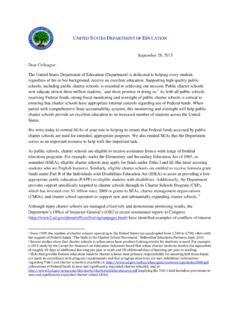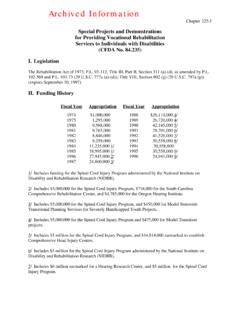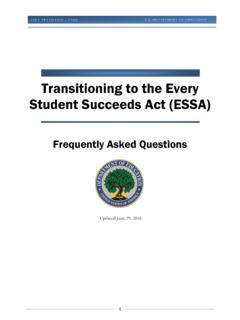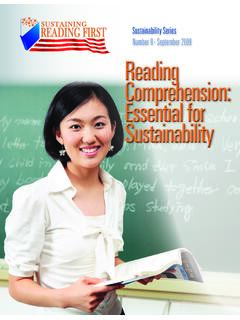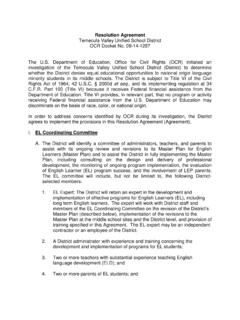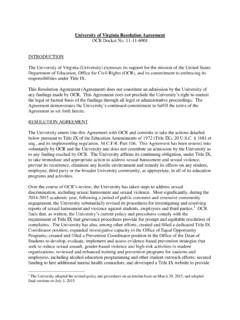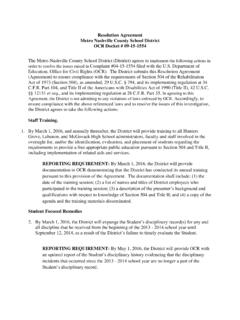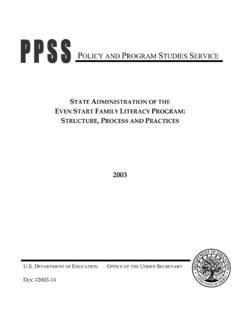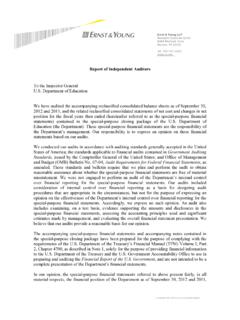Transcription of Policy Statement on Family Engagement—From The Early …
1 DEPARTMENT OF HEALTH AND HUMAN SERVICES. DEPARTMENT OF EDUCATION. Policy Statement ON Family engagement . FROM THE Early YEARS TO THE Early GRADES. May 5, 2016. PURPOSE. This Policy Statement from the Departments of Health and Human Services (HHS) and Education (ED) provides recommendations1 to Early childhood systems and programs on Family engagement . Family engagement refers to the systematic inclusion of families in activities and programs that promote children's development, learning, and wellness, including in the planning, development, and evaluation of such activities, programs, and systems. For Family engagement to be integrated throughout Early childhood systems and programs, providers and schools must engage families as essential partners when providing services that promote children's learning Family engagement and development, nurture positive relationships between families and staff, and promotes children's support families.
2 The term Family as used in this Statement is inclusive of all learning and healthy adults who interact with Early childhood systems in support of their child, to development include biological, adoptive, and foster parents; grandparents; legal and informal guardians; and adult siblings. Early childhood systems include child care options, Head Start and Early Head Start, Early intervention programs, preschool programs, and elementary school from kindergarten through third grade. Providers include teachers and paraprofessionals in schools, preschools, and Head Start and Early Head Start classrooms; child-care providers, Early intervention service providers; related service personnel; comprehensive services staff;. and other professionals that work directly with children in Early childhood systems.
3 The lives and experiences of young children are intertwined with those of their families. Families are children's first and most important teachers, advocates, and nurturers. Strong Family engagement in Early childhood systems and programs is central not supplemental to promoting children's healthy intellectual, physical, and social-emotional development; preparing children for school; and supporting academic achievement in elementary school and beyond. Research indicates that families' involvement in children's learning and development impacts lifelong health, developmental, and academic outcomes. Family engagement in Early childhood systems and programs supports families as they teach, nurture, and advocate for their children, and in turn, Family engagement supports and improves the Early childhood systems that care for and teach children.
4 When families and the programs where children learn work together and 1. The information in this document is intended to assist State and local agencies to carry out their obligations under the applicable statutes and regulations and does not impose any new requirements. 1. support each other in their respective roles, children have a more positive attitude toward school, stay in school longer, have better attendance, and experience more school The Departments recognize the critical role of Family engagement in promoting children's success in Early childhood systems and programs. As such, both agencies have developed research-based Family engagement frameworks to guide the development of effective Family engagement policies and practices: HHS's Head Start Parent, Family , and community engagement Framework and ED's Dual Capacity-Building Framework for Family -School Partnerships (see Appendix).
5 This Policy Statement identifies common principles from these frameworks that drive effective Family engagement across Early childhood systems and programs. It is the goal of the Departments that all Early childhood systems recognize and support families as essential partners in providing services that improve children's development, learning and wellness. This joint HHS- ED Statement aims to advance this goal by: 1. Reviewing the research base and best practices that support effective Family engagement in children's learning, development, and wellness;. 2. Identifying core principles of effective Family engagement practices from HHS' and ED's Family engagement frameworks to drive successful Policy and program development, implementation, and evaluation;. 3. Providing recommendations to States, State educational agencies (SEAs), lead agencies for Early intervention services and child care , local educational agencies (LEAs), schools, and community -based Early childhood systems and programs to implement effective Family engagement ; and 4.
6 Highlighting resources to build programmatic and Family capacity to be effective partners. OVERVIEW. Highlights from Related Research and Best Practices Families have strong and sustained effects on children's development, learning, and wellness. Studies indicate that nurturing, responsive, and sensitive parenting promotes social-emotional competence and academic Fathers' involvement in their children's learning has been found to have positive effects on children's cognition, language, and social-emotional Other studies find that activities such as reading and talking to young children leads to positive outcomes. For example, infants and toddlers who are read to more often have better language and cognition skills than their peers who are read to less High-quality verbal interactions between young children and their caregivers predict vocabulary size and 2.
7 Henderson, & Mapp, (2002). A new wave of evidence: The impact of school, Family and community connections on student achievement. Austin: SEDL. 3. Thompson, R. (2008). Early attachment and later development: Familiar questions, new answers. In J. Cassidy, & P. R. Shaver (Eds.), Handbook of attachment (2nd ed., pp. 348-365). New York: Guilford. 4. Cabrera, N., Shannon, J., & Tamis-LeMonda, C. (2007). Fathers' influence on their children's cognitive and emotional development: From toddlers to pre-k. Applied Developmental Science, 11(4), 208-213. 5. Raikes, H., Green, B. L., Atwater, J., Kisker, E., Constantine, J., & Chazan-Cohen, R. (2006). Involvement in Early Head Start home visiting services: Demographic predictors and relations to child and parent outcomes. Early Childhood Research Quarterly, 21, 2-24.
8 2. school readiness later in Children of families who engage in these Early learning activities at home, and have materials available to enrich these experiences, show more advanced vocabulary and literacy Promoting enriching learning activities in the classroom and in the home, facilitated by all of the adults in children's lives, contributes to children's learning and developmental outcomes and is a central component of effective Family engagement . Family well-being is also a strong predictor of children's school readiness. Financial stability during the Early childhood years has been found to improve children's academic achievement, promote positive behavior, and foster mental Parents', in particular mothers', educational attainment is predictive of children's future economic Families' with secure housing, health care, and access to nutritious food have positive effects on children's development and lack of access to these basic resources can have adverse Parental health and mental health can impact parenting and children's outcomes.
9 For example, parental depression may contribute to less responsive parenting and is associated with anxiety and depression in , 12 Other parental mental health difficulties, such as anxiety, trauma, and substance abuse, can also contribute to children's behavioral and academic , 14 While many families are strong and resilient in the face of adversity, this research points toward an important fact: the programs where children learn and develop should not ignore Family wellness if they want to meaningfully engage families and fulfill their mission to prepare children for school and academic success. Supports that build on Family strengths and promote Family wellness may be provided in schools and Early childhood programs through onsite comprehensive services. Supports can also be provided through partnerships with organizations and specialists in the community .
10 One promising approach that combines an integrated set of Family education, employment, workforce training, and related social service supports for adults and their children is referred to as a two-generation The goal of two-generation approaches is to lift families out of poverty and to support children's long-term outcomes. 6. Hart, B., & Risley, T. R. (1995). Meaningful differences in the everyday experiences of young American children. Baltimore, MD: Brookes. 7. Rodriguez, E., & Tamis-LeMonda, C. S. (2011). Trajectories of the home learning environment across the first five years: Associations with children's language and literacy skills at pre-kindergarten. Child Development, 82(4), 1058-1075. 8. Duncan, G. J., & Magnuson, K. (2011). The long reach of Early childhood poverty.
